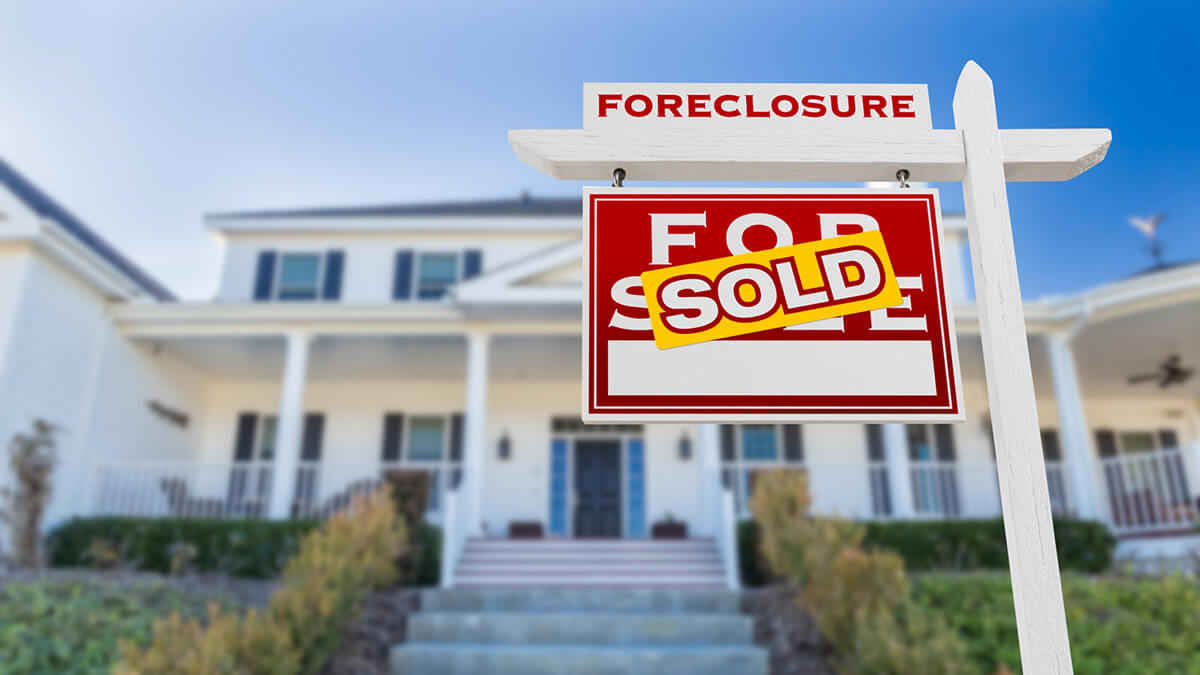At the moment, there are a total of 33,952 properties with foreclosure fillings.
While homeowners believe that foreclosure is inevitable when they fail to make their mortgage payments, this is far from the truth. Homeowners have another option, and that is to make a short sale. What is a short sale vs. a foreclosure?
To learn more about the difference between short sale vs. foreclosure and the buying process for each, continue reading.
What is a short sale?
A short sale is when you sell your property for less than what you still owe on the mortgage.
For instance, if you still owe $250,000 on the mortgage, you could sell the home quickly for $200,000. However, you would still be responsible for paying the remainder of the mortgage, in this case, $50,000, and any cost associated with the sale.
Most importantly, you cannot begin the short sale process without getting approval from your mortgage lender. The lender must sign off on the sale before it can proceed.
Lenders often lose money on a short sale, so you will be required to provide documentation stating why a short sale is necessary. You will need to prove that your financial troubles were recent. Common examples include:
- Divorce
- Health problems
- Job loss
If you list any financial struggles you disclosed to the lender when you first applied for the mortgage, the lender will deny your short sale. Additionally, if you mention any pre-existing financial struggles you didn’t previously disclose to the lender, the lender will see you as dishonest and likely not approve the sale.
Once the lender approves the short sale and the property sells, the lender will collect the proceeds. The lender may forgive the remaining mortgage balance, but since the homeowner is still responsible for paying it, the lender may try to collect the funds through a deficiency judgment.
What is a foreclosure?
A foreclosure is when the mortgage holder takes legal action against you after you fail to make your monthly mortgage payments. The lender takes ownership of the property, then sells it to recover the mortgage amount.
Pre-foreclosure can begin a few months after you fail to make several months of payments. The number of payments you need to miss varies from lender to lender and between mortgage terms.
Each state governs foreclosure proceedings, so lenders must abide by these rules. This includes how lenders notify homeowners and provide alternative solutions, like refinancing options, to bring the loan up to date and avoid foreclosure.
What’s the difference between a foreclosure and a short sale?
Both short sales and foreclosures help you get out of paying your mortgage. But, the most significant difference between a short sale and a foreclosure is choice. A homeowner can choose to make a short sale. The process is voluntary.
Conversely, foreclosures are involuntary. The lender takes legal action to control and sell the property regardless of what the homeowner says or does.
Another difference is that homeowners engage in the short sale process, while only the lenders participate in the foreclosure process. When the homeowner decides to make a short sale, they will sell the home through a realtor. However, foreclosed properties sell in a public auction at the courthouse.
Short sale vs. foreclosure: impact on credit report
While short sales and foreclosures both negatively impact your credit report, short sales don’t do as much damage.
The average credit score drop for a short sale is 50-150 points. The effect may only last for 12 to 18 months. Yet, for a foreclosure, the drop is 200-400 points.
Typically a foreclosure stays on your credit report for seven to ten years. For the first five years, you cannot buy a new home. After five years, you may be able to purchase a new home, but it will come with restrictions. After seven years, you can buy a new home without restrictions.
You will also be required to report foreclosure on all future loan applications.
However, a short sale may never show up on your credit report. The creditor has the option to report the debt reduction to credit agencies. Many don’t report it. You can purchase a new home immediately after a short sale with some conditions. You may need to report the short sale on future loan applications, but it’s not always necessary.
Short sale buying process
Buyers looking to buy a short-sale property will have better investment opportunities than buying foreclosed properties.
But, interested buyers should look for a pre-approved short sale. This is when the lender approves the property’s sale price before it goes on the open market. It signals that the lender and homeowner are ready to sell the property.
If you negotiate the sale with the lender, they can reject any offer. Lenders, especially banks, are well known for having slow response times because there is a lot to consider regarding a short sale transaction.
The lender wants to recover as much of the principal mortgage loan as possible. Thus, they often won’t accept an offer below the current market value or lower than the amount still owed on the mortgage. However, if the lender does accept an offer, it will still take time to process.
Instant Valuation, Confidential Deals with a Certified iBuyer.com Specialist.
Sell Smart, Sell Fast, Get Sold. No Obligations.
This is why scouting for a preapproved short sale is best.
You can find short-sale properties on a multiple listing service (MLS). Set your search options to short-sale listings, and filter out short sales that are subject to lender approval or require a third-party review. A third-party review means the lender has yet to approve the short sale.
You can also network with real estate investors, agents, and wholesalers to find short-sale listings.
Further, the local courthouse will have a record of properties in pre-foreclosure. The owners of these homes haven’t paid their mortgage for several months, and the lender has filed a notice of default. If the homeowner doesn’t negotiate a solution with the lender or pay the balance, the property can be considered a short sale.
Pros of a short sale
Short-sale homes are often in better condition than foreclosures, which is why they provide better investment opportunities. Homeowners who decide to short-sell usually try to lessen the damage to their credit score by maintaining the property.
Sometimes, short sales will sell for below market value, offering buyers an excellent opportunity to find a deal. This is especially so with preapproved short-sale properties. Plus, there is often less competition for short-sale properties because many don’t want to negotiate with the lender due to its inconvenience.
Cons of a short sale
Since short-sale properties are sold as-is, buyers assume some risk. For example, the homeowner could change their mind and pay their past-due balance to keep the home. The money you spent during the home buying process for inspections would be lost.
On the other hand, the house could require a lot of maintenance or be in poor condition because the homeowner didn’t have the funds to keep it up.
Furthermore, short sales take longer to close because there are multiple lienholders. The process also requires more paperwork and due diligence than traditional home-buying.
Foreclosure buying process
Like the short sale buying process, lenders want to recoup as much of the mortgage balance owed during a foreclosure sale. Banks don’t want to be landlords, so they try to sell the property as fast as possible for as much as possible.
Unlike short sales, with a foreclosed property, you usually don’t get to tour the home or order an inspection before purchasing it. Since the property will be sold as-is, you need to pay close attention to the listing to understand the property’s condition better.
Additionally, many foreclosures require a cash payment. Therefore, if you want to take out a mortgage for the purchase, you need to look for other home-buying options.
To find foreclosure opportunities, you can consult the following:
- Bank offices
- Foreclosure websites
- Local newspapers
- MLS
- Real estate agents and online searches
Foreclosure pros
More often than not, foreclosed properties sell for below current market value, and the sale happens quickly. This is because lenders are eager to get rid of the property, and closing a cash offer is faster than a short sale or standard home purchase.
Foreclosures also come with a clean title. After a foreclosure, the bank will remove all liens and encumbrances from the previous owner.
Foreclosure cons
The federal government states that 42% of households have mortgages, and the average mortgage debt is just over $200,000. Thus, providing a cash offer is challenging for many who want to purchase a foreclosed home.
Further, those with cash on hand often end up with a property needing significant improvements. Homeowners with financial woes tend to neglect maintenance or abandon the property altogether. Even if you get a property at a significantly lower price, you may need to spend a lot of money on renovations.
Need to sell your house?
For those behind on their mortgage payments, carefully weighing the pros and cons of a short sale vs. foreclosure can help you decide the best way to recover the most funds for your property while saving your credit score. Many buyers are interested in purchasing your home, especially for a below-market price.
If you’re interested in selling your house, let iBuyer.com help. Get your home valuation now and quickly sell your home for cash.
Looking for cash offers on your home? You’ve come to the right place!
Reilly Dzurick is a seasoned real estate agent at Get Land Florida, bringing over six years of industry experience to the vibrant Vero Beach market. She is known for her deep understanding of local real estate trends and her dedication to helping clients find their dream properties. Reilly’s journey in real estate is complemented by her academic background in Public Relations, Advertising, and Applied Communication from the University of North Florida.




